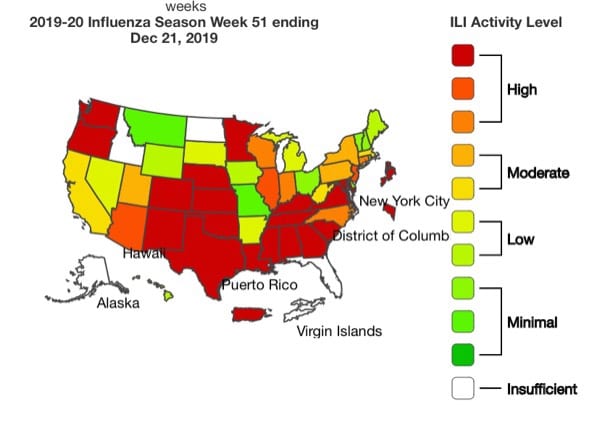BALTIMORE, MD—According to the latest report from CDC FluView, flu activity continues to increase across the U.S. and has been elevated for seven consecutive weeks.
Most of this activity is being caused by influenza B and influenza A(H1N1) viruses.
Flu activity in Maryland has risen to “high,” according to the Centers for Disease Control.
During week 51 of 2019, the following influenza-like illness (ILI) activity levels were experienced:
- High – District of Columbia, Puerto Rico, New York City, and 25 states (Alabama, Arizona, Colorado, Connecticut, Georgia, Illinois, Indiana, Kansas, Kentucky, Louisiana, Maryland, Minnesota, Mississippi, Nebraska, New Jersey, New Mexico, North Carolina, Oklahoma, Oregon, South Carolina, Tennessee, Texas, Virginia, Washington, and Wisconsin)
- Moderate – six states (California, Massachusetts, New York, Pennsylvania, Utah, and West Virginia)
- Low – nine states (Arkansas, Hawaii, Iowa, Maine, Michigan, Nevada, Rhode Island, South Dakota, and Wyoming)
- Minimal – six states (Delaware, Missouri, Montana, New Hampshire, Ohio, and Vermont)
- Data were insufficient to calculate an ILI activity level from the U.S. Virgin Islands and four states (Alaska, Florida, Idaho, and North Dakota).
During week 51, the following influenza activity was reported:
- Widespread – 39 states (Alabama, Alaska, Arizona, Arkansas, California, Colorado, Connecticut, Delaware, Florida, Georgia, Idaho, Illinois, Indiana, Iowa, Kentucky, Louisiana, Maryland, Massachusetts, Minnesota, Mississippi, Montana, Nebraska, Nevada, New Jersey, New Mexico, New York, North Carolina, Ohio, Oklahoma, Oregon, Pennsylvania, Rhode Island, South Carolina, Tennessee, Texas, Virginia, Washington, West Virginia and Wyoming)
- Regional – nine states (Kansas, Maine, Michigan, Missouri, New Hampshire, North Dakota, South Dakota, Utah, and Wisconsin)
- Local – the District of Columbia and two states (Hawaii and Vermont)
- Sporadic – the U.S. Virgin Islands
- Guam and Puerto Rico did not report.
Officials say it’s not too late to get vaccinated. Flu vaccination is the best way to prevent flu and its potentially serious complications.
Antiviral medications are an important adjunct to flu vaccine in the control of influenza. Almost all (>99%) of the influenza viruses tested this season are susceptible to the four FDA-approved influenza antiviral medications recommended for use in the U.S. this season.
Do you value local journalism? Support NottinghamMD.com today.

